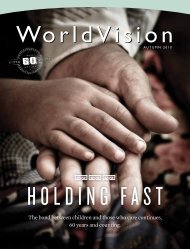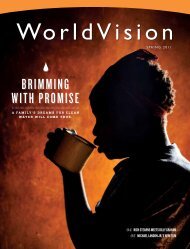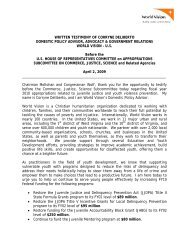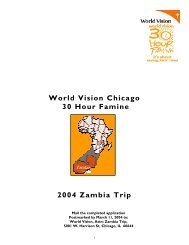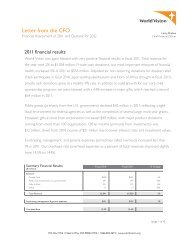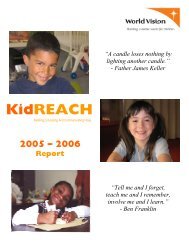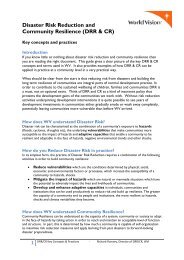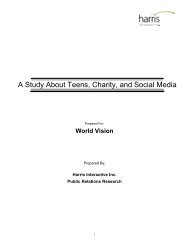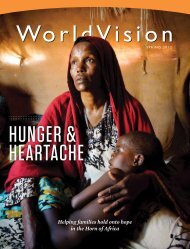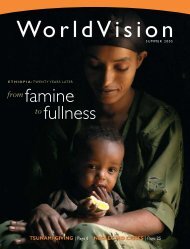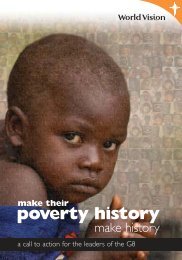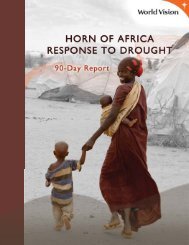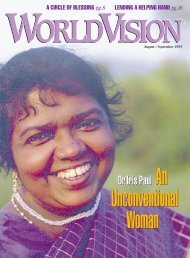A Citizen's Guide to Advocacy - World Vision
A Citizen's Guide to Advocacy - World Vision
A Citizen's Guide to Advocacy - World Vision
You also want an ePaper? Increase the reach of your titles
YUMPU automatically turns print PDFs into web optimized ePapers that Google loves.
A Citizen’s <strong>Guide</strong><br />
<strong>to</strong> <strong>Advocacy</strong>
Acknowledgements<br />
In creating this handbook, we are deeply indebted <strong>to</strong> our colleagues in <strong>World</strong> <strong>Vision</strong>’s nearly<br />
100 offices around the world who work daily <strong>to</strong> directly serve the needs of the poor and facilitate<br />
local advocacy efforts. We are also grateful <strong>to</strong> the donors and advocates who share the mission<br />
of <strong>World</strong> <strong>Vision</strong> <strong>to</strong> serve the poor.<br />
It is our hope and prayer that the <strong>to</strong>ols outlined in this book will support a movement that will<br />
help change the conditions of those living with extreme poverty, disease, and exploitation—and<br />
that the lives of American communities will be transformed in pursuing this end.<br />
Handbook author: Jennifer A. Goodson<br />
Handbook edi<strong>to</strong>rs: Rory Anderson, Corryne Deliber<strong>to</strong>, Kristie Dokes, Serge Duss, Ben Irwin,<br />
Craig Jaggers, Amber Johnson, Joseph Mettimano, Joan Mussa, Amy Parodi, Shawna Temple<strong>to</strong>n,<br />
Sheryl Watkins, and Robert Zachritz<br />
Dear Friend,<br />
Thank you for your interest in joining <strong>World</strong> <strong>Vision</strong> as an advocate for the poor and<br />
oppressed.<br />
Scripture calls <strong>to</strong> us: “Speak up for those who cannot speak for themselves, for the rights of<br />
all who are destitute. Speak up and judge fairly; defend the rights of the poor and needy”<br />
(Proverbs 31:8-9, NIV).<br />
As Christians and Americans, we enjoy great freedom and effectiveness in our ability <strong>to</strong><br />
influence government policy, legislation, U.S. foreign aid, and public opinion. By partnering<br />
with <strong>World</strong> <strong>Vision</strong>’s advocacy program, you will have opportunities <strong>to</strong> make a meaningful<br />
impact on a range of important issues. From the AIDS epidemic <strong>to</strong> child exploitation,<br />
children need you <strong>to</strong> advocate for their special needs and protection.<br />
This handbook provides the basic <strong>to</strong>ols and training you will need <strong>to</strong> get started. Also,<br />
when you visit our advocacy Web site, www.seekjustice.org, you’ll have access <strong>to</strong> briefings<br />
on specific issues, updates, and online advocacy opportunities.<br />
Whether you are doing this on your own or with your church, school, place of work, or<br />
community organization, I am sure you will find your advocacy efforts on behalf of children<br />
<strong>to</strong> be a rewarding experience.<br />
Thank you for partnering with us in this exciting and urgent work.<br />
God bless you,<br />
Joseph Mettimano<br />
Vice President, <strong>Advocacy</strong><br />
<strong>World</strong> <strong>Vision</strong> U.S.
Table of Contents<br />
Introduction 6<br />
Our <strong>Vision</strong> 7<br />
<strong>Advocacy</strong> 8<br />
Issues Facing the <strong>World</strong>’s Poor 10<br />
Sending a Message <strong>to</strong> Congress 16<br />
Tips for Media Coverage 22<br />
Online Social Networking 27<br />
Talk Radio Stations 27<br />
Involving Your Community and Church 28<br />
Involving Your Social Networks 31<br />
Involving Your College or University 32<br />
<strong>Advocacy</strong> and the Arts 33<br />
<strong>Advocacy</strong> and Film 34<br />
<strong>Advocacy</strong> and Children 35<br />
<strong>Advocacy</strong> and Athletes 36<br />
A Kenyan boy holds a <strong>World</strong> <strong>Vision</strong> sign encouraging<br />
care for AIDS-affected people. <strong>Advocacy</strong> begins at<br />
the local level and gains momentum as we all work<br />
<strong>to</strong>gether <strong>to</strong> bring about change.<br />
© 2006 Elimasia Mngumi/<strong>World</strong> <strong>Vision</strong><br />
Making Change a Reality 37<br />
Notes 38
Introduction<br />
Can you imagine a world where political leaders actively address the needs of the<br />
world’s poor? Where citizens and elected officials work <strong>to</strong>gether <strong>to</strong> achieve change<br />
on behalf of the most underrepresented populations around the globe?<br />
You can play an important role in making this a reality.<br />
You can be a voice for millions who are impacted by poverty, war, and unjust policies<br />
around the world. You can take meaningful action <strong>to</strong> influence public officials and<br />
help correct these problems.<br />
Our hope is that this handbook will help you identify where and how you can make<br />
the greatest difference. It provides an introduction <strong>to</strong> <strong>World</strong> <strong>Vision</strong>’s advocacy work<br />
and offers practical resources you can use <strong>to</strong> take meaningful action as an advocate<br />
on behalf of the world’s poor and oppressed.<br />
Within these pages you will find both traditional and creative ways <strong>to</strong> influence<br />
© 2006 Jon Warren/<strong>World</strong> <strong>Vision</strong><br />
policymakers and mobilize your community. The suggestions offered in this handbook<br />
are meant <strong>to</strong> equip you—but not <strong>to</strong> limit the scope of your own creativity.<br />
Our team is available <strong>to</strong> work with you and provide some essential resources <strong>to</strong><br />
help you exercise your citizenship. Together, we can seek justice and bring about<br />
Our vision for every child, life in all its fullness.<br />
Our prayer for every heart, the will <strong>to</strong> make it so.<br />
change for some of the most underrepresented populations around the world.<br />
6<br />
Thank you for partnering with us. You and your community can make a difference.<br />
7<br />
Introduction |<br />
Now, let’s get started.<br />
Our <strong>Vision</strong><br />
<strong>World</strong> <strong>Vision</strong> is a Christian humanitarian organization dedicated <strong>to</strong> working with<br />
| Our <strong>Vision</strong><br />
What is advocacy?<br />
Simply put, advocacy is a ministry of influence using persuasion, dialogue,<br />
and reason <strong>to</strong> affect change. <strong>Advocacy</strong> seeks <strong>to</strong> address the structural and<br />
systemic causes of poverty by changing policies, practices, and attitudes<br />
that perpetuate inequality and deny justice.<br />
children, families, and their communities worldwide <strong>to</strong> reach their full potential by<br />
tackling the causes of poverty and injustice. We serve approximately 100 million<br />
people in nearly 100 countries, including 1.6 million in the U.S. In communities<br />
around the world, we join with local people <strong>to</strong> find lasting ways <strong>to</strong> improve the<br />
lives of poor children and families. Motivated by our faith in Jesus Christ, we serve<br />
alongside the poor and oppressed as a demonstration of God’s unconditional love<br />
for all people.<br />
<strong>World</strong> <strong>Vision</strong> serves all people, regardless of religion, race, ethnicity, or gender.
The importance of advocacy<br />
Injustice is a reflection of broken relationships. <strong>World</strong> <strong>Vision</strong> bases its advocacy<br />
work on the same values that shape our humanitarian work: our Christian commitment.<br />
We believe that the person of Jesus Christ provides the model and basis for<br />
our advocacy—namely, His identification with the poor, the afflicted, the oppressed,<br />
and the marginalized; His special concern for children; His respect for the dignity<br />
God bes<strong>to</strong>ws on women and men; His willingness <strong>to</strong> challenge unjust attitudes and<br />
<strong>World</strong> <strong>Vision</strong> staff with representatives<br />
of McKesson Corp.<br />
(a <strong>World</strong> <strong>Vision</strong> partner), an<br />
African AIDS caregiver, and<br />
an Acting on AIDS fellow in<br />
Washing<strong>to</strong>n, D.C. <strong>to</strong> promote<br />
<strong>World</strong> <strong>Vision</strong>’s Caregiver Kit<br />
program, which is <strong>to</strong>uching<br />
AIDS-affected communities<br />
worldwide.<br />
systems; His call <strong>to</strong> share our resources with each other; His love for all people<br />
without discrimination or conditions; and His offer of new life through faith in Him.<br />
From Jesus we derive our holistic understanding of the gospel of the kingdom of<br />
God, which forms the basis of our response <strong>to</strong> human need.<br />
<strong>World</strong> <strong>Vision</strong>’s advocacy work is also based on our commitment <strong>to</strong> the poor. We are<br />
called <strong>to</strong> aid people in great need—<strong>to</strong> relieve their suffering and <strong>to</strong> help transform<br />
their condition of life.<br />
© 2008 <strong>World</strong> <strong>Vision</strong><br />
We stand in solidarity with the poor in a<br />
8<br />
<strong>Advocacy</strong> |<br />
<strong>Advocacy</strong><br />
Our his<strong>to</strong>ry<br />
<strong>World</strong> <strong>Vision</strong>’s advocacy office in Washing<strong>to</strong>n, D.C., was started in 1985. Our team<br />
of policy experts is responsible for working with the U.S. Congress and the Executive<br />
Branch <strong>to</strong> make sure the needs of the world’s poor are represented. Our campaigns team<br />
informs and equips Americans <strong>to</strong> partner in this work. Examples of passed legislation and<br />
policy change due <strong>to</strong> these efforts include:<br />
How long will you defend<br />
the unjust and show<br />
partiality <strong>to</strong> the wicked?<br />
Defend the cause of the<br />
weak and fatherless;<br />
maintain the rights of<br />
the poor and oppressed.<br />
Rescue the weak and<br />
needy; deliver them from<br />
the hand of the wicked.<br />
– Psalm 82:2-4<br />
common search for justice, seeking <strong>to</strong><br />
understand their situation and working<br />
alongside them <strong>to</strong> experience fullness of life.<br />
We strive <strong>to</strong> facilitate engagement between<br />
the poor and the affluent in ways that open<br />
both <strong>to</strong> transformation. We respect the<br />
poor as active participants, not passive recipients,<br />
in this relationship. They are people<br />
from whom others may learn and receive.<br />
The need for transformation is common <strong>to</strong><br />
all. Together we share this quest for justice,<br />
peace, reconciliation, and healing in our<br />
broken world.<br />
9<br />
| <strong>Advocacy</strong><br />
• The Northern Uganda Crisis Response Act<br />
This is accomplished when we represent the interests of the poor <strong>to</strong> decision makers<br />
Speak up for those<br />
who cannot speak<br />
for themselves, for<br />
the rights of all who<br />
are destitute. Speak<br />
up and judge fairly;<br />
defend the rights of<br />
the poor and needy.<br />
– Proverbs 31:8-9<br />
• The U.S. Leadership Against HIV/AIDS,<br />
Tuberculosis, and Malaria Act<br />
• The Clean Diamond Trade Act<br />
• The Trafficking Victims Protection Act<br />
• The PROTECT Act<br />
• The Sudan Peace Act<br />
• Funding for effective humanitarian programs<br />
Our policy positions and advocacy campaigns are<br />
focused on specific issues rooted in <strong>World</strong> <strong>Vision</strong>’s<br />
who then formulate legislation and policy that prioritizes their needs. Our response<br />
<strong>to</strong> poverty and injustice requires us <strong>to</strong> work for policy change and challenge those<br />
who withhold justice. Effective advocacy addresses the root causes—whether with<br />
governments, religious institutions, the general public, or all of these.<br />
An essential element of advocacy is building a relationship with those whose needs<br />
are underrepresented and bringing their interests <strong>to</strong> the attention of governments,<br />
businesses, churches, or the general public in ways that address them effectively.<br />
Being a compelling advocate may begin with raising awareness in your household,<br />
community, workplace, or local church. As Americans, we have a unique privilege<br />
and responsibility <strong>to</strong> be a voice for those who otherwise may not be heard.<br />
work with the poor in their communities.
GuluWalk supporters march <strong>to</strong><br />
raise awareness of the challenges<br />
faced by children as a result of<br />
the conflict in Gulu, Uganda.<br />
Issues like this that harm children<br />
require more than knowledge—<br />
they require partnership and<br />
action from people worldwide.<br />
© 2005 Simon Richard Mugenyi/<strong>World</strong> <strong>Vision</strong><br />
Global development<br />
To increase the overall level of humanitarian<br />
assistance from the U.S. government<br />
and continue leading global efforts <strong>to</strong><br />
address the root causes of global poverty,<br />
<strong>World</strong> <strong>Vision</strong> advocates for effective<br />
measures that will help achieve the<br />
Millennium Development Goals (MDGs).<br />
Critical needs<br />
• Ensuring that the U.S. champions<br />
the achievement of the MDGs and<br />
provides the financial resources<br />
necessary for reaching these goals<br />
• Increased foreign aid and food<br />
assistance<br />
<strong>World</strong> <strong>Vision</strong>/ONE Campaign rally in Chicago, 2007.<br />
© 2007 Bob Black/Genesis Pho<strong>to</strong>s<br />
10<br />
Issues Facing the <strong>World</strong>’s Poor |<br />
Issues Facing the <strong>World</strong>’s Poor<br />
Statistics on issues like global poverty and health, conflict and disasters, and the<br />
various ways children are exploited can be overwhelming. They leave many people<br />
trapped by emotion or paralyzed by their sheer magnitude.<br />
What makes the difference between general awareness and effective action? Part<br />
of the answer is rooted in partnership. It is not possible for an individual advocate<br />
<strong>to</strong> be well-versed in all of the issues. However, when you involve your community,<br />
family, and social networks, you can begin <strong>to</strong> have more of an impact. Your collective<br />
partnership around our advocacy efforts can truly make a world of difference.<br />
<strong>World</strong> <strong>Vision</strong>’s advocacy work focuses on the themes outlined below. We are committed<br />
<strong>to</strong> keeping you informed and providing substantive ways for you <strong>to</strong> influence<br />
your government and involve your communities. It is our belief that as you advocate<br />
The Millennium Development Goals<br />
The MDGs represent a new global partnership initiating<br />
unprecedented efforts <strong>to</strong> meet the needs of the world’s<br />
poorest people. There are eight specific goals:<br />
1. Halve extreme poverty and hunger.<br />
2. Achieve universal primary education.<br />
3. Promote gender equality and empower women.<br />
4. Reduce child mortality.<br />
5. Improve maternal health.<br />
6. Combat HIV/AIDS, malaria, and other diseases.<br />
7. Ensure environmental sustainability.<br />
8. Develop a global partnership for development.<br />
11<br />
| Issues Facing the <strong>World</strong>’s Poor<br />
for the world’s poor, you will experience a process of transformation—one that will<br />
change you and those you bring with you.<br />
For up-<strong>to</strong>-date resources and calls <strong>to</strong> action, please visit our advocacy Web site,<br />
www.seekjustice.org.
Global poverty and health<br />
To help secure a better future for the world’s poorest children, <strong>World</strong> <strong>Vision</strong><br />
focuses on lasting, community-based transformation. Our long-term projects help<br />
families gain access <strong>to</strong> critical necessities such as clean water, sustainable food<br />
sources, health care, education, and economic opportunities. Through our development<br />
and advocacy work, we also<br />
address special challenges like the AIDS<br />
pandemic, malaria, and exploitative<br />
practices that threaten children and<br />
keep communities trapped in poverty.<br />
Speaker at a Goldman Sachs conference in<br />
Washing<strong>to</strong>n, D.C., where attendees partnered<br />
with <strong>World</strong> <strong>Vision</strong> <strong>to</strong> create Caregiver Kits for<br />
AIDS caregivers worldwide.<br />
© 2007 Michael Temchine Pho<strong>to</strong>graphy<br />
Critical needs<br />
• Increased resources for water and<br />
sanitation, food and agriculture,<br />
health and hygiene, education<br />
and literacy, and microenterprise<br />
development<br />
• For the U.S. government <strong>to</strong> bolster<br />
its commitment <strong>to</strong> providing assistance<br />
for the poor and strengthening<br />
its global leadership in combating<br />
AIDS and malaria<br />
Conflicts and disasters<br />
When natural disasters strike, survivors<br />
like these in Chile need people and organizations<br />
like <strong>World</strong> <strong>Vision</strong> <strong>to</strong> advocate on<br />
their behalf for timely, life-saving action.<br />
© 2006 Rena<strong>to</strong> Hernandez/<strong>World</strong> <strong>Vision</strong><br />
Recognizing that conflicts and disasters have a significant impact on children, <strong>World</strong> <strong>Vision</strong><br />
advocates for peace in areas of conflict, robust life-saving action in the event of<br />
12<br />
emergencies, and risk mitigation in disaster-prone regions around the world. Conflicts,<br />
emergencies, and disasters endanger and impoverish children. Governments and inter-<br />
13<br />
Issues Facing the <strong>World</strong>’s Poor |<br />
<strong>Advocacy</strong> works!<br />
Working hand-in-hand with <strong>World</strong> <strong>Vision</strong>, people like you have<br />
contributed <strong>to</strong> the fight against AIDS, tuberculosis, and malaria<br />
by sending tens of thousands of messages <strong>to</strong> the U.S. Congress.<br />
This work has resulted in advancements such as the President’s<br />
Emergency Plan for AIDS Response (PEPFAR) and the President’s<br />
Malaria Initiative (PMI). More recently, our combined efforts<br />
contributed <strong>to</strong> the passage of an authorization bill that provides<br />
$48 billion over five years for a multifaceted approach <strong>to</strong><br />
combating AIDS, tuberculosis, and malaria around the world.<br />
Advocates who partner with <strong>World</strong> <strong>Vision</strong> play a significant role<br />
by supporting programs that assist those impacted by these<br />
diseases, especially orphans and vulnerable children.<br />
national bodies have a responsibility <strong>to</strong> protect children and their families, <strong>to</strong> treat them<br />
equitably, and <strong>to</strong> ensure their access <strong>to</strong> basic necessities. When these conditions are not<br />
met, national governments must be supported or held accountable by the international<br />
community and local leaders <strong>to</strong> res<strong>to</strong>re peace, security, and family livelihoods.<br />
Critical areas<br />
• Conflict areas including northern Uganda, the Democratic Republic of Congo,<br />
Israel and Palestine, Sudan, and others<br />
• Disaster-prone regions such as Africa, Latin America, and Asia<br />
Critical needs<br />
• U.S. diplomacy encouraging governments in conflict areas <strong>to</strong> take responsibility for<br />
peace arrangements and the equitable treatment of all people groups, including the<br />
provision of land and security<br />
• U.S. responsiveness and leadership following major disasters <strong>to</strong> address the critical<br />
humanitarian needs of people and rally other nations <strong>to</strong> respond<br />
| Issues Facing the <strong>World</strong>’s Poor
<strong>Advocacy</strong> can bring life-changing<br />
help and hope <strong>to</strong> children in<br />
countries like Cambodia and<br />
protect vulnerable children from<br />
the dangers of exploitation.<br />
© 2004 Jon Warren/<strong>World</strong> <strong>Vision</strong><br />
Children in crisis<br />
To address the specific needs of children vulnerable <strong>to</strong> exploitation, <strong>World</strong> <strong>Vision</strong><br />
advocates for their protection and for the res<strong>to</strong>ration of survivors. We partner<br />
with law enforcement agencies <strong>to</strong> assist in the identification and prosecution of those<br />
who abuse children. <strong>World</strong> <strong>Vision</strong> is working <strong>to</strong> strengthen policies that protect<br />
children from exploitative child labor, human trafficking, sexual exploitation, and<br />
conditions of war, including the recruitment and use of child soldiers.<br />
Critical needs<br />
• Protection of vulnerable populations in areas of conflict, poverty, and<br />
disease where people may be exposed <strong>to</strong> recruitment in<strong>to</strong> trafficking rings<br />
and military groups<br />
• Res<strong>to</strong>ration and reintegration of children who have been abused as child<br />
soldiers and sex slaves<br />
• Enforcement of laws that prosecute Americans who travel abroad for<br />
child sex <strong>to</strong>urism<br />
• Measures that reduce child labor<br />
Youth in the United States<br />
Young people growing up in poor com-<br />
<strong>World</strong> <strong>Vision</strong>’s work in the U.S. includes the<br />
Youth Empowerment Project, which provides<br />
young people with skills, training, and practical<br />
experiences <strong>to</strong> address local issues through<br />
advocacy, transformative leadership development,<br />
and civic engagement.<br />
© 2007 Laura Reinhardt/<strong>World</strong> <strong>Vision</strong><br />
munities across the U.S. often face hardships<br />
and have little hope for a better<br />
future, despite the freedoms they enjoy<br />
in our nation. In order <strong>to</strong> address critical<br />
issues of domestic poverty, <strong>World</strong> <strong>Vision</strong><br />
seeks <strong>to</strong> open doors of opportunity for<br />
marginalized youth by working <strong>to</strong> reduce<br />
youth violence and advocating for critical<br />
improvements <strong>to</strong> public education. We<br />
also work <strong>to</strong> strengthen the leadership<br />
and civic empowerment skills of young<br />
people so they are equipped <strong>to</strong> initiate<br />
15<br />
| Issues Facing the <strong>World</strong>’s Poor<br />
change in their own communities.<br />
Critical needs<br />
• Reduction of youth violence and the prevention of youth involvement in gangs<br />
• Improvements <strong>to</strong> the quality of public education
Sample letter<br />
The following template is also available at www.seekjustice.org. Templates<br />
such as this one can be cus<strong>to</strong>mized. Advocates are encouraged <strong>to</strong> send a<br />
consistent message, while adding a personal connection when it strengthens<br />
their position on a piece of legislation.<br />
16<br />
Sending a Message <strong>to</strong> Congress |<br />
Congresswoman Jan Schakowsky (right) receives thanks from<br />
the <strong>World</strong> <strong>Vision</strong> organizer for speaking at a clean water rally<br />
in Chicago. Affirming members of Congress for their action<br />
on critical issues helps assure their continued efforts.<br />
© 2007 Bob Black/Genesis Pho<strong>to</strong>s<br />
Sending a Message <strong>to</strong> Congress<br />
In this section you will learn more about effective ways of communicating with your<br />
member of Congress by initiating letter-writing campaigns, meeting with your congressmember,<br />
and involving the media <strong>to</strong> promote effective awareness. You may<br />
also want <strong>to</strong> visit www.thomas.loc.gov <strong>to</strong> do some of your own research, learn<br />
about the legislative process, identify the status of a bill, or investigate your elected<br />
official’s voting record.<br />
The most critical starting point is <strong>to</strong> become familiar with the issues. Citizen<br />
advocates have many <strong>to</strong>ols at their disposal. <strong>World</strong> <strong>Vision</strong> provides up-<strong>to</strong>-date<br />
information and news on our advocacy Web site, www.seekjustice.org. You can<br />
use the site <strong>to</strong> identify your member of Congress and send him or her an e-mail.<br />
It is the mandate of elected officials <strong>to</strong> listen <strong>to</strong> the concerns of the people they<br />
Dear Sena<strong>to</strong>r Murray:<br />
I am greatly concerned about the estimated 250,000 children<br />
who are exploited each day in state-run armies, paramilitaries,<br />
and guerrilla groups around the world. These “child soldiers”<br />
serve as combatants, porters, human mine detec<strong>to</strong>rs, and sex<br />
slaves. Their health and lives are endangered and their childhoods<br />
are sacrificed.<br />
Sena<strong>to</strong>rs Durbin and Brownback have introduced the Child<br />
Soldier Prevention Act of 2007 (S.1175) <strong>to</strong> encourage governments<br />
<strong>to</strong> disarm, demobilize, and rehabilitate child soldiers from<br />
government forces and government-supported paramilitaries.<br />
This bill is rightly directed at national governments that receive<br />
U.S. military assistance, <strong>to</strong> ensure that U.S. taxpayer dollars are<br />
not used <strong>to</strong> finance the exploitation of children in armed conflict.<br />
This is an important issue for my family and me. I urge you <strong>to</strong><br />
cosponsor this bill.<br />
I look forward <strong>to</strong> your reply.<br />
Sincerely,<br />
SAMPLE<br />
17<br />
| Sending a Message <strong>to</strong> Congress<br />
represent. For this reason, elected officials welcome feedback and input from their<br />
constituents. It is important <strong>to</strong> let them know which issues are of particular importance<br />
<strong>to</strong> you. You may not have direct access <strong>to</strong> the elected official, but you can<br />
Jane Smith<br />
Tacoma, WA<br />
always leave comments with a staff person who will then take appropriate action.<br />
The three best ways <strong>to</strong> deliver a message <strong>to</strong> Congress are sending e-mails, writing<br />
letters, and making phone calls.
To generate a persuasive number of phone calls, form a telephone-tree network of<br />
activists. Ask every person in your network <strong>to</strong> deliver a message <strong>to</strong> your congres-<br />
Letter-writing is a powerful and effective way <strong>to</strong> engage<br />
members of Congress. Even a small group of concerned<br />
citizens can help bring an issue <strong>to</strong> the forefront.<br />
© 2007 Jon Warren/<strong>World</strong> <strong>Vision</strong><br />
sional office. This flood of calls can help sway an undecided vote or convince a<br />
legisla<strong>to</strong>r who is unsure where the public stands on a particular issue.<br />
SAMPLE<br />
18<br />
Sending a Message <strong>to</strong> Congress |<br />
Hello, my name is and I live in (<strong>to</strong>wn or city<br />
or county).<br />
I am an advocate for children, families, and communities impacted by<br />
extreme poverty and disease. I have been reading about the progress<br />
of renewing program funding that impacts children affected by AIDS<br />
and malaria.<br />
I am calling <strong>to</strong> support the reauthorization of the Global AIDS, TB, and<br />
Malaria Bill.<br />
I strongly support the provisions for orphans and vulnerable children, as<br />
well as the provisions that provide basic treatment <strong>to</strong> eradicate malaria.<br />
Please let the Sena<strong>to</strong>r/Congressperson know of my support for this<br />
important piece of legislation.<br />
Thank you.<br />
Letter-writing campaigns<br />
An innovative letter-writing campaign is an effective way <strong>to</strong> ensure that issues such<br />
as global poverty and AIDS reach the eyes and ears of your member of Congress.<br />
The most compelling way <strong>to</strong> do this is <strong>to</strong> involve a large number of people and have<br />
them all send in the same kind of letter—whether an e-mail, a written letter, a form<br />
postcard, or a creative idea that can be easily replicated. The more creative and<br />
innovative you can be, the more likely you are <strong>to</strong> attract media attention, as well as<br />
the attention of your member of Congress.<br />
Congressional offices are organized <strong>to</strong> listen <strong>to</strong> constituents and respond <strong>to</strong> their concerns.<br />
A member of Congress who does not support funding for children impacted by<br />
AIDS may justify this by reasoning that his or her constituents have not communicated<br />
their concern about the number of children who are orphaned by the AIDS pandemic.<br />
Just a few letters from constituents on a<br />
single <strong>to</strong>pic will encourage the congressional<br />
office <strong>to</strong> pay more attention <strong>to</strong> that<br />
issue than <strong>to</strong> most of the 10,000 or more<br />
other bills and resolutions that are introduced<br />
every year. Letters and calls are<br />
logged and summarized for the member<br />
as a way <strong>to</strong> gauge the strength and direction<br />
of public opinion. By organizing your<br />
community or colleagues in a campaign,<br />
you can make a difference in the passing of<br />
legislation and policy change that will benefit<br />
vulnerable populations such as children<br />
orphaned by AIDS or trapped in war.<br />
Petitions and letters <strong>to</strong> Congress can help influence<br />
U.S. laws and policies that affect the poor.<br />
© 2006 Paul Bettings/<strong>World</strong> <strong>Vision</strong><br />
19<br />
| Sending a Message <strong>to</strong> Congress
Participants in the Lobby Day for Northern Uganda gather in<br />
Sena<strong>to</strong>r Ted Kennedy’s office. Co-sponsored by organizations<br />
like <strong>World</strong> <strong>Vision</strong>, this lobbying event allowed concerned citizens<br />
<strong>to</strong> personally urge their members of Congress <strong>to</strong> take action <strong>to</strong><br />
support peace talks and reconstruction efforts in northern Uganda.<br />
© 2008 Laura Reinhardt/<strong>World</strong> <strong>Vision</strong><br />
During the meeting<br />
• Be accurate. To build a working relationship that leads <strong>to</strong> action, you need <strong>to</strong> be<br />
a credible source of information. If you don’t know something, just say so. Tell<br />
the person you will find out and get back <strong>to</strong> him or her. If you need assistance,<br />
feel free <strong>to</strong> contact <strong>World</strong> <strong>Vision</strong>’s <strong>Advocacy</strong> team at advocate@worldvision.org.<br />
• Be brief. Members of Congress and their staffs are incredibly busy—and so are<br />
you. Most members of Congress represent more than 600,000 people. They<br />
appreciate it when you get <strong>to</strong> the point and respect their time. Your meeting or<br />
call may be interrupted, so be sure <strong>to</strong> state your request in the first few minutes.<br />
• Be respectful. You may have differences with your member of Congress.<br />
However, harsh criticism, cynicism, or sarcasm most likely will cause him or her<br />
<strong>to</strong> tune you out. Be mindful of your attitude and nonverbal communication so<br />
you do not miss the opportunity <strong>to</strong> build common ground on the issues you are<br />
discussing.<br />
In-district meetings<br />
If you are traveling <strong>to</strong> Washing<strong>to</strong>n, D.C., meeting with your member of Congress or one<br />
of his or her staff members can be very effective. Visiting your representative while he or<br />
she is in your home area is also effective. Times of year that they are likely <strong>to</strong> be home<br />
include congressional recesses in August, November, December, and May. Schedule<br />
your meeting in advance, and be sure <strong>to</strong> prepare talking points. You do not need a large<br />
delegation <strong>to</strong> have a significant impact. If you have organized a large-scale letter-writing<br />
campaign, then bring along your <strong>to</strong>p three spokespeople <strong>to</strong> deliver the letters in person<br />
and discuss your recommendations. <strong>World</strong> <strong>Vision</strong> can provide suggested talking points <strong>to</strong><br />
help you prepare for your meeting.<br />
• Be specific. When discussing a specific piece of legislation or policy action with<br />
members of Congress, make a point <strong>to</strong> mention the bill by number or the<br />
specific action you’d like him or her <strong>to</strong> take (for example, holding a hearing or<br />
contacting the president’s administration), give reasons why you support the bill,<br />
and let them know that you are a constituent.<br />
• Be persistent. If you find that the staff people you need <strong>to</strong> speak with are out of<br />
the office, leave a message for them with your name and number. If they don’t<br />
return your call within two or three days, call again. Keep track of your calls, but<br />
remember that they are very busy.<br />
20<br />
Sending a Message <strong>to</strong> Congress |<br />
The U.S. Census Bureau<br />
reports that 64 percent<br />
of citizens age 18 and over<br />
voted in the 2004 presidential<br />
election, up from 60<br />
percent in 2000. Tables from<br />
a November 2004 survey<br />
show that of 197 million citizens,<br />
72 percent (142 million)<br />
reported that they were<br />
registered <strong>to</strong> vote.<br />
Preparing for your meeting<br />
• Wherever or whomever you meet, always<br />
prepare thoroughly for your meeting.<br />
• Re-familiarize yourself with the issues<br />
you are representing, and download<br />
<strong>World</strong> <strong>Vision</strong>’s suggested talking points at<br />
www.seekjustice.org.<br />
• Practice what you are going <strong>to</strong> say beforehand,<br />
so you sound natural and not like you<br />
are reading from a script. Practicing will<br />
build your confidence and increase your<br />
effectiveness.<br />
• Dress appropriately and be on time.<br />
Following up<br />
After meeting with a member of Congress or an aide from his or her office, it’s<br />
important <strong>to</strong> stay on <strong>to</strong>p of the situation. Here are some suggestions for follow-up.<br />
• Thank your members of Congress for listening <strong>to</strong> your concerns, especially if<br />
they take action.<br />
• Praise them publicly through letters <strong>to</strong> the edi<strong>to</strong>r or items in newsletters. If you<br />
have a letter or article published, be sure <strong>to</strong> send a copy <strong>to</strong> their staff.<br />
• Seek <strong>to</strong> build positive, long-term relationships. Remember that if you publicly<br />
praise your elected officials when they are helpful, the next time they may help<br />
even more.<br />
• Provide information as needed. Be prepared <strong>to</strong> fax or e-mail information <strong>to</strong> your<br />
elected official’s office. If you do send something, call immediately <strong>to</strong> make sure<br />
they’ve received it.<br />
• Contact <strong>World</strong> <strong>Vision</strong>’s <strong>Advocacy</strong> team so we can stay connected <strong>to</strong> your work.<br />
Send an e-mail <strong>to</strong> advocate@worldvision.org <strong>to</strong> tell us about your experience.<br />
21<br />
| Sending a Message <strong>to</strong> Congress
ather than the metro section, for example. Try visiting your newspaper or<br />
television station’s Web site and find a link <strong>to</strong> submit a s<strong>to</strong>ry. This option is often<br />
featured prominently on their home page.<br />
When submitting a s<strong>to</strong>ry, it is helpful <strong>to</strong> include the following information:<br />
• A brief summary of the local, personal angle related <strong>to</strong> the event and issue<br />
• Type of event<br />
• Sponsoring organization(s)<br />
Personal interest s<strong>to</strong>ries appeal <strong>to</strong> local media;<br />
a regular citizen’s personal connection <strong>to</strong> a<br />
humanitarian situation can bring attention <strong>to</strong><br />
issues that might otherwise be overlooked.<br />
© 2006 Kevin Cook/<strong>World</strong> <strong>Vision</strong><br />
• The name and contact number for the person or organization that readers<br />
should call for information before, during, and after the event<br />
• Day, date, and time of the event<br />
• Event location<br />
• Estimated number of participants<br />
• Why readers will be interested in the event<br />
Tips for Media Coverage<br />
How <strong>to</strong> pitch your s<strong>to</strong>ry<br />
Pitching your s<strong>to</strong>ry can be as simple as leaving a message with a TV station’s “tip<br />
22<br />
Getting a local newspaper, radio, or TV station <strong>to</strong> talk about your advocacy issue<br />
or cover your events is a great way <strong>to</strong> raise awareness.<br />
line” or mailing a press release <strong>to</strong> your local paper’s news desk. If your s<strong>to</strong>ry is<br />
strong enough, it will make it <strong>to</strong> the right reporter.<br />
23<br />
Tips for Media Coverage |<br />
The three best ways <strong>to</strong> spread the word about what you’re doing and generate<br />
news coverage are pitching a local human interest s<strong>to</strong>ry, writing opinion edi<strong>to</strong>rials,<br />
and sending letters <strong>to</strong> the edi<strong>to</strong>r.<br />
Human interest s<strong>to</strong>ries<br />
Local papers often need more than a notice of an event <strong>to</strong> garner their interest.<br />
However, if you are able <strong>to</strong> develop relationships with local reporters, producers,<br />
and edi<strong>to</strong>rs, you may find it easier <strong>to</strong> pitch your s<strong>to</strong>ries—and see them placed.<br />
The more you can match your s<strong>to</strong>ry <strong>to</strong> a particular reporter’s interests (whether<br />
their beat is religion, city news, or local events), the more likely it is that your<br />
s<strong>to</strong>ry will be placed.<br />
| Tips for Media Coverage<br />
However, many love <strong>to</strong> highlight local human-interest s<strong>to</strong>ries, including actions taken<br />
by community members <strong>to</strong> address a larger issue. To pick up this kind of coverage,<br />
reporters in your area need <strong>to</strong> know what the personal s<strong>to</strong>ry is and how it relates<br />
<strong>to</strong> the issue and the event you are holding. You may want them <strong>to</strong> cover your event,<br />
and the best way <strong>to</strong> get that coverage is <strong>to</strong> find a local, personal angle.<br />
First, familiarize yourself with the local outlets <strong>to</strong> which you’re interested in pitching<br />
the s<strong>to</strong>ry. Many local stations have shows other than their standard news programs<br />
that may be a better fit for your s<strong>to</strong>ry. In addition, explore the various sections of<br />
your local newspaper. Your s<strong>to</strong>ry may fit better in<strong>to</strong> the religion or business section,<br />
© 2008 SXC<br />
A good way <strong>to</strong> raise<br />
awareness in your<br />
community is <strong>to</strong> get<br />
a local newspaper <strong>to</strong><br />
cover your event or<br />
otherwise highlight<br />
the issue you’re passionate<br />
about.
Op-ed pieces<br />
Letters <strong>to</strong> the edi<strong>to</strong>r<br />
Opinion edi<strong>to</strong>rials can be a great way <strong>to</strong> inform community members about an issue<br />
and your call <strong>to</strong> action. Newspapers will often run pieces written by grassroots activists,<br />
especially if the article is well-written, timely, and has a local angle. However, you should<br />
check with your newspaper before submitting your edi<strong>to</strong>rial, as different papers often<br />
have different guidelines for edi<strong>to</strong>rial submissions from community members.<br />
Letters <strong>to</strong> the edi<strong>to</strong>r are another great way <strong>to</strong> raise awareness in your community<br />
about the issue at hand and <strong>to</strong> let people know how they can advocate for change.<br />
The key <strong>to</strong> getting your letter printed is <strong>to</strong> make it relevant <strong>to</strong> your local community,<br />
whether that means letting readers know about local lobbying visits or asking your<br />
paper’s edi<strong>to</strong>r <strong>to</strong> run more s<strong>to</strong>ries on a specific issue.<br />
Here are a few tips for writing your edi<strong>to</strong>rial:<br />
Here are a few more tips for getting your letter published:<br />
• Keep it short. Most papers will only run edi<strong>to</strong>rials of fewer than 750 words.<br />
• Keep it short. Most letters <strong>to</strong> the edi<strong>to</strong>r run no more than 150-200 words.<br />
24<br />
Tips for Media Coverage |<br />
• Make it locally relevant. The more you connect your edi<strong>to</strong>rial <strong>to</strong> a community<br />
event or development on the issue, the better. Newspapers publish information they<br />
believe is pertinent <strong>to</strong> their readers, so your op-ed is more likely <strong>to</strong> be published<br />
when it is tied <strong>to</strong> a current, local event or targets local leaders (for example, when<br />
it responds <strong>to</strong> the actions—or lack thereof—of your member of Congress). Often<br />
lobbying efforts, legislative developments, or breakthroughs in peace talks are interesting<br />
<strong>to</strong> newspapers only if there is a local connection <strong>to</strong> the issue.<br />
• Make it personal. While your op-ed should include facts about the issue, it should<br />
also reflect your personality. The best edi<strong>to</strong>rials explain why the subject is relevant<br />
<strong>to</strong> both the writer and the reader. Tell your own s<strong>to</strong>ry and why you care about the<br />
issue you are campaigning for.<br />
• Make it action-oriented. Include<br />
information on how readers can get<br />
involved. If you’re writing an op-ed near<br />
the time that the lobbying visits are<br />
taking place, make sure your edi<strong>to</strong>rial<br />
includes information on how readers<br />
can join your efforts. Edi<strong>to</strong>rs are unlikely<br />
<strong>to</strong> include a Web site or call <strong>to</strong> action<br />
in the body of your article. However,<br />
you should include a Web site in your<br />
biography at the end of your op-ed.<br />
You can also encourage your readers <strong>to</strong><br />
write their member of Congress.<br />
Don’t forget <strong>to</strong> include your contact information.<br />
Newspapers need <strong>to</strong> know<br />
how <strong>to</strong> reach you if they’re going <strong>to</strong> run<br />
your edi<strong>to</strong>rial.<br />
No bullhorn required—simply writing an<br />
opinion edi<strong>to</strong>rial for your local newspaper can<br />
spread the word in your community about a<br />
poverty-related issue that’s important <strong>to</strong> you.<br />
© 2008 SXC<br />
• Keep it focused. Unlike edi<strong>to</strong>rials, letters <strong>to</strong> the edi<strong>to</strong>r only allow space <strong>to</strong> make<br />
one or two key points. Focus on what you think is the most important thing for<br />
people in your community <strong>to</strong> know about the issue and what they can do <strong>to</strong> help.<br />
• Make it relevant. Respond <strong>to</strong> coverage the publication has already done. If<br />
possible, praise the publication when it provides good reporting on these issues.<br />
Publications are less likely <strong>to</strong> print letters that do not pertain <strong>to</strong> their coverage.<br />
As with op-ed pieces, don’t forget <strong>to</strong> include your contact information when you submit<br />
a letter <strong>to</strong> the edi<strong>to</strong>r.<br />
Don’t forget AIDS relief when setting fed budget<br />
Duluth News Tribune | January 26, 2007<br />
SAMPLE<br />
The new Congress is focused on the war in Iraq and rightly so. But an issue of<br />
supreme importance is being overlooked. In danger of being rescinded is $1 billion<br />
in aid <strong>to</strong> programs that help treat AIDS, tuberculosis, and malaria overseas.<br />
The President’s Emergency Plan for AIDS Relief had a $1 billion increase in aid for<br />
2007, but because of other impending issues, the funding is in danger of being forgotten.<br />
Congress is spending $100 billion annually on the war in Iraq. $100 billion! All<br />
the President’s Emergency Plan for AIDS Relief is asking is $1 billion <strong>to</strong> save lives.<br />
If Congress decides not <strong>to</strong> enact the $1 billion increase, 350,000 HIV-positive people<br />
due <strong>to</strong> undergo treatment will not receive the medications they need. Mark Dybul,<br />
the U.S. Global AIDS Coordina<strong>to</strong>r, estimated that 110,000 <strong>to</strong> 175,000 of these people<br />
will die as a result. This can’t be allowed <strong>to</strong> happen. Everyone can help by writing<br />
<strong>to</strong> state and local representatives, asking them <strong>to</strong> approve this promised aid. We can<br />
help save lives.<br />
25<br />
| Tips for Media Coverage<br />
Danielle Bourgerie<br />
Superior, MN
26<br />
Tips for Media Coverage |<br />
SAMPLE<br />
Remind candidates <strong>to</strong> help suffering world’s poor<br />
The Gazette | December 23, 2007<br />
As we enjoy this lovely time of year, we should not forget that<br />
one of every six people on the globe <strong>to</strong>day struggles <strong>to</strong> survive<br />
on an income of less than $1 a day and therefore cannot provide<br />
adequate nutrition and health care for a family. For example,<br />
26,000 children die each day of easily preventable diseases like<br />
malaria and measles † . This holiday season is a time when we<br />
often remember the needy among us and generously share our<br />
abundance with them. But private charity by itself cannot meet<br />
the enormous challenges of global poverty.<br />
Our federal government’s poverty-focused development<br />
assistance efforts have given hope and opportunity <strong>to</strong> some<br />
of the poorest people in the world, through American programs<br />
like the U.S. Agency for International Development (USAID),<br />
and through our support of international programs like<br />
UNICEF and the <strong>World</strong> Health Organization.<br />
However, just 40 cents out of every $100 in the federal budget<br />
goes <strong>to</strong> such poverty-focused development assistance. Surely<br />
our nation can do better. Since we Iowans are privileged <strong>to</strong> lead<br />
off the process of selecting a new president, we have an opportunity<br />
<strong>to</strong> remind the candidates of their responsibility <strong>to</strong> try <strong>to</strong><br />
reduce the suffering of the world’s poorest people.<br />
Allen Fisher<br />
Cedar Rapids, IA<br />
†<br />
Edi<strong>to</strong>r’s note: According <strong>to</strong> the United Nations, more than 26,000 children under age 5 die every day, most from preventable causes such as malnutrition and disease.<br />
Online Social Networking<br />
Online forums are another great way <strong>to</strong> lend your voice <strong>to</strong> promote change. You<br />
can use your blog, MySpace page, or Facebook profile <strong>to</strong> inform your friends and<br />
invite them <strong>to</strong> join you in advocating on behalf of the poor. Blogs are a perfect forum<br />
<strong>to</strong> invite people in<strong>to</strong> a conversation about issues that are important <strong>to</strong> you. You can<br />
also encourage other bloggers <strong>to</strong> link <strong>to</strong> your post.<br />
YouTube is another great resource. Offbeat and funny videos preside here, but<br />
more serious ones are featured as well. Consider posting videos of your youth<br />
group, small group, Acting on AIDS chapter (a <strong>World</strong> <strong>Vision</strong> advocacy program<br />
for college students; see page 32), or group of friends advocating on behalf of the<br />
world’s poor. Be sure <strong>to</strong> post a link of your video <strong>to</strong> your other social networking<br />
sites for maximum exposure.<br />
Talk Radio Stations<br />
Radio programs such as your local talk show or National Public Radio (NPR) are<br />
another excellent way <strong>to</strong> make your voice heard—and by a large audience, <strong>to</strong>o.<br />
Calling in <strong>to</strong> a program that highlights a political or social issue important <strong>to</strong> you is<br />
one way you can express your own beliefs about that issue.<br />
NPR also invites listeners <strong>to</strong> suggest s<strong>to</strong>ry ideas through their Web site:<br />
http://www.npr.org/about/pitch. If it’s been a while since you’ve heard anything<br />
“call-in worthy,” suggest a s<strong>to</strong>ry based on your advocacy efforts with <strong>World</strong> <strong>Vision</strong>.<br />
© 2008 <strong>World</strong> <strong>Vision</strong><br />
27<br />
| Online Social Networking / Talk Radio Stations
On Take Your Child <strong>to</strong> Work Day, the ONE Campaign<br />
and Goldman Sachs partnered with <strong>World</strong> <strong>Vision</strong> <strong>to</strong> build<br />
Caregiver Kits for distribution <strong>to</strong> people affected by AIDS<br />
around the world.<br />
©2007 Michael Temchine Pho<strong>to</strong>graphy<br />
One of the challenges for an organizer is <strong>to</strong> direct the desire for change in<strong>to</strong> effective<br />
action steps. Consider some of the options in this guide or visit www.seekjustice.org<br />
<strong>to</strong> access more resources, including suggestions for speakers, events, and ways <strong>to</strong> pray.<br />
<strong>World</strong> <strong>Vision</strong> provides recommended books, Bible studies, declaration cards, and<br />
other advocacy materials <strong>to</strong> assist with your local efforts. We also have resources for<br />
pas<strong>to</strong>rs and church leaders who want <strong>to</strong> engage their congregations. Organizing a<br />
prayer vigil is one way that churches can actively learn and intercede for the poor.<br />
Effective advocacy goes hand-in-hand with intercession and other spiritual disciplines.<br />
You can involve others in advocacy by creating letter-writing campaigns and other<br />
advocacy-related events when you return from missions trips. You may also engage<br />
your community by hosting a <strong>to</strong>wn hall meeting <strong>to</strong> discuss issues facing the poor with<br />
your elected officials.<br />
28<br />
Involving Your Community and Church |<br />
Involving Your Community and Church<br />
Advocates who partner with <strong>World</strong> <strong>Vision</strong> include high school youth, college students,<br />
young professionals, parents of young children, and seasoned professionals in<br />
various fields. <strong>Advocacy</strong> on behalf of the poor is a movement that brings <strong>to</strong>gether<br />
people from many different backgrounds.<br />
“Never doubt that a<br />
small group of thoughtful,<br />
committed citizens<br />
can change the world.<br />
Indeed, it is the only<br />
thing that ever has.”<br />
Consider ways that your church, small group, book<br />
club, professional association, or family can get<br />
involved. You can choose <strong>to</strong> organize large events,<br />
or you can start with those closest <strong>to</strong> you. More<br />
often than not, social movements exist because<br />
a small group of committed people set out <strong>to</strong> do<br />
something. The goal for your community organizing<br />
efforts is <strong>to</strong> educate people and inspire action.<br />
“Is not this the kind of fasting I have chosen: <strong>to</strong> loose the chains of<br />
injustice and untie the cords of the yoke, <strong>to</strong> set the oppressed free<br />
and break every yoke? Is it not <strong>to</strong> share your food with the hungry<br />
and <strong>to</strong> provide the poor wanderer with shelter—when you see the<br />
naked, <strong>to</strong> clothe him, and not <strong>to</strong> turn away from your own flesh<br />
and blood? Then your light will break forth like the dawn, and your<br />
healing will quickly appear; then your righteousness will go before<br />
you, and the glory of the Lord will be your rear guard. Then you<br />
will call, and the Lord will answer; you will cry for help, and he will<br />
say: Here am I. “If you do away with the yoke of oppression, with<br />
the pointing finger and malicious talk, and if you spend yourselves<br />
in behalf of the hungry and satisfy the needs of the oppressed,<br />
then your light will rise in the darkness, and your night will become<br />
like the noonday.”<br />
– Isaiah 58:6-10<br />
29<br />
| Involving Your Community and Church<br />
– Margaret Mead
Advocate Profile: Scott and Ashley Phillips<br />
As a student of intercultural studies at Fuller Theological Seminary specializing in children<br />
at risk, Ashley Phillips examined the AIDS crisis in Uganda for a research paper.<br />
She read in a <strong>World</strong> <strong>Vision</strong> publication about the dark spiritual dimensions and bloody<br />
his<strong>to</strong>ry of the war in northern<br />
Uganda, and learned about the<br />
atrocities inflicted upon Ugandan<br />
children and families by the rebel<br />
Lord’s Resistance Army (LRA).<br />
Princess Zulu testifies before Congress in favor of the<br />
reauthorization of the President’s Emergency Plan for AIDS<br />
Relief. A variety of subject matter experts like Princess are<br />
available through <strong>World</strong> <strong>Vision</strong>’s Speakers Bureau <strong>to</strong> address<br />
professional or social networking audiences.<br />
© 2007 Geraldine Ryerson-Cruz/<strong>World</strong> <strong>Vision</strong><br />
Ashley shared the report with<br />
her husband, Scott, also a Fuller<br />
student. “It brought us <strong>to</strong> a<br />
difficult conversation with God,”<br />
says Scott. “We had become<br />
passionate in our desire for<br />
change [in Uganda], but weren’t<br />
sure how <strong>to</strong> become engaged.”<br />
30<br />
Involving Your Social Networks |<br />
Scott and Ashley Phillips, who as post-graduate students<br />
felt called <strong>to</strong> be agents of social change, with Awichu<br />
Akwanya, a former Ugandan child soldier. Pho<strong>to</strong> courtesy<br />
of Scott and Ashley Phillips.<br />
Then Scott and Ashley learned<br />
about a local GuluWalk event,<br />
a walk organized <strong>to</strong> raise<br />
awareness about child soldiers.<br />
They decided <strong>to</strong> participate, and<br />
Scott agreed <strong>to</strong> chair the event.<br />
“When you realize the size of the problem, it is overwhelming; but knowing there is an<br />
opportunity <strong>to</strong> take part in what God is already doing—that’s a privilege,” says Scott.<br />
In February 2008, Scott was one of an estimated 800 participants at the Lobby Day for<br />
Northern Uganda in Washing<strong>to</strong>n, D.C. “I really want <strong>to</strong> learn more about how <strong>to</strong> unify<br />
groups around a movement—how <strong>to</strong> help make inroads <strong>to</strong> bring other people along<br />
and make them feel a connection with the issue,” says Scott.<br />
Scott and Ashley have found a shared and unique call <strong>to</strong> care for the children of northern<br />
Uganda. They continue <strong>to</strong> prayerfully seek out <strong>to</strong>ols <strong>to</strong> help them be a voice for<br />
these children and broaden the base of Americans who care about them.<br />
Involving Your Social Networks<br />
Consider speaking or inviting a speaker <strong>to</strong> your professional or social network. Find<br />
out if your professional network, association, or local faith and culture series is looking<br />
for new speakers. If you are leading in this area already, <strong>World</strong> <strong>Vision</strong> will be glad <strong>to</strong><br />
provide talking points and resources you can share with your audience. If you would<br />
like <strong>to</strong> invite a <strong>World</strong> <strong>Vision</strong> spokesperson, send a request <strong>to</strong> our Speakers Bureau at<br />
speakersbureau@worldvision.org.<br />
31<br />
| Involving Your Social Networks<br />
If you are already a member of a social justice network and would like <strong>to</strong> partner with<br />
<strong>World</strong> <strong>Vision</strong> in our advocacy efforts, please e-mail advocate@worldvision.org.
Scott Sabo, student leader of Acting on AIDS at<br />
the University of Washing<strong>to</strong>n, addresses a group of<br />
students at a rally during the “Do You See Orange”<br />
creative activism campaign.<br />
© 2007 Andrea Dearborn/<strong>World</strong> <strong>Vision</strong><br />
<strong>Advocacy</strong> and the Arts<br />
Art inspires people in ways that global statistics never will. If you are an artist of any<br />
kind, consider how your art can portray the suffering and hope of children around<br />
the world. Art does not have <strong>to</strong> be overtly focused on a specific issue <strong>to</strong> inspire<br />
people <strong>to</strong> action. But if you would like <strong>to</strong> integrate advocacy in<strong>to</strong> your local shows,<br />
please contact our team at advocate@worldvision.org so we can provide you with<br />
information and support.<br />
If you consider yourself a patron of the arts, we encourage you <strong>to</strong> support artists<br />
who bring their voice and imagination <strong>to</strong> these issues. If you are a community<br />
organizer, consider partnering with an artist, pho<strong>to</strong>grapher, or performer <strong>to</strong> create<br />
an awareness-raising event.<br />
32<br />
Involving Your College or University |<br />
Involving Your College or University<br />
Educating students on global issues of poverty and empowering them with resources<br />
<strong>to</strong> take action can inspire a generational response.<br />
Acting on AIDS is a network started by college students <strong>to</strong> raise awareness and<br />
promote advocacy in response <strong>to</strong> the global AIDS pandemic. With the support<br />
of <strong>World</strong> <strong>Vision</strong>, college students have formed Acting on AIDS chapters on more<br />
than 170 campuses around the nation. Students engage in a wide variety of efforts<br />
in response <strong>to</strong> global AIDS and poverty. Utilizing creative activism campaigns and<br />
transformational resources, students are encouraged <strong>to</strong> form communities that<br />
respond <strong>to</strong> these issues socially, politically, economically, and spiritually.<br />
Motivated by an authentic pursuit of Jesus Christ, Acting on AIDS exists <strong>to</strong> support<br />
a grassroots movement of student advocates who, through their faithful, radical response<br />
<strong>to</strong> global poverty and injustice, demonstrate God’s love for those affected by<br />
these issues. To learn more about how <strong>to</strong> get involved, visit www.actingonaids.org.<br />
“Artists are s<strong>to</strong>rytellers.<br />
What we create illuminates a<br />
narrative of our own personal<br />
journey, articulates the circumstances<br />
in the human passage,<br />
and the attempt <strong>to</strong> step in<strong>to</strong><br />
the shoes of another. It is my<br />
assumption that orphans and<br />
vulnerable children need s<strong>to</strong>rytellers<br />
<strong>to</strong> translate their situation<br />
in a manner that opens<br />
up viewers’ hearts and moves<br />
them <strong>to</strong> compassionate action.<br />
“Paintings can become memorials for the s<strong>to</strong>ries of others. The visual<br />
process helps break through these walls around the human heart as we<br />
come <strong>to</strong> grips with a tragic reality. One of my goals as an artist and<br />
advocate is <strong>to</strong> open the human heart <strong>to</strong> the need of children impacted<br />
by AIDS. Collaborating with <strong>World</strong> <strong>Vision</strong> has opened my own eyes,<br />
expanded my art, and engaged a broader community in becoming<br />
advocates for children in crisis.”<br />
—Scott Erickson, The Transpire Project<br />
© 2007 Jon Warren/<strong>World</strong> <strong>Vision</strong><br />
33<br />
| <strong>Advocacy</strong> and the Arts
<strong>Advocacy</strong> and Film<br />
Film is one of the most accessible and influential mediums in our culture. Consider the<br />
box office choices you make on opening weekends. Your vote tells Hollywood what<br />
Americans want <strong>to</strong> see. Whenever possible, attend films that address contemporary<br />
and his<strong>to</strong>rical issues of injustice and leaders who made a difference. Recent feature<br />
films have portrayed the s<strong>to</strong>ry of child soldiers and the diamond trade, as <strong>to</strong>ld in Blood<br />
Diamond, and the life of revolutionary abolition leader and member of the British<br />
Parliament William Wilberforce, as seen in Amazing Grace. As a community organizer,<br />
you may wish <strong>to</strong> use film screenings as a vehicle <strong>to</strong> create awareness of an issue.<br />
Austin Gutwein, founder of Hoops of Hope,<br />
addresses an audience. Hoops of Hope has raised<br />
more than $200,000 <strong>to</strong> benefit AIDS-affected<br />
communities in Africa through <strong>World</strong> <strong>Vision</strong>.<br />
Austin was first moved <strong>to</strong> help after seeing a<br />
<strong>World</strong> <strong>Vision</strong> video when he was 9 years old.<br />
© 2008 Pat Rhoads/<strong>World</strong> <strong>Vision</strong><br />
34<br />
<strong>Advocacy</strong> and Film |<br />
“Four years in the making,<br />
Testimony: Africa is an emotionally<br />
compelling film and coffee table<br />
book documenting the s<strong>to</strong>ries<br />
of three ordinary Africans struggling<br />
against AIDS, genocide, and<br />
hunger, all while portraying the<br />
hope they have for their lives and<br />
the world around them through<br />
the miracle of transformational<br />
development. It’s the Africa s<strong>to</strong>ry<br />
that still needs <strong>to</strong> be <strong>to</strong>ld: that<br />
these big issues can be defeated,<br />
that people in extreme poverty<br />
can indeed make something of their lives, and that sustainable development<br />
is likely <strong>to</strong> be the only way <strong>to</strong> do so.”<br />
© 2007 Brian Sytsma/<strong>World</strong> <strong>Vision</strong><br />
—Sean Sheridan, 4:Minute Media, Inc.<br />
<strong>Advocacy</strong> and Children<br />
Children can be very effective advocates. Consider including children who want <strong>to</strong> be<br />
involved as participants and even spokespeople for your local awareness-raising events.<br />
Encourage their ideas—from hosting a local bake sale <strong>to</strong> creating multimedia presentations<br />
that reach their peers. There are many ways <strong>to</strong> include children and youth in advocacy<br />
efforts. Remember, the best ideas for their involvement often come from them.<br />
<strong>World</strong> <strong>Vision</strong> works <strong>to</strong> empower youth <strong>to</strong> engage their local and national government<br />
officials. Resources and publications for youth, including free downloads, are available at<br />
www.worldvision.org. It is important <strong>to</strong> educate children about global issues and encourage<br />
them <strong>to</strong> take meaningful action. You may want <strong>to</strong> begin with one of the following options:<br />
• Start a children’s club at school that is committed <strong>to</strong> advocating for an issue that impacts<br />
children globally. Children may want <strong>to</strong> create their own campaign <strong>to</strong> raise awareness<br />
about child labor or provide more children with bed nets <strong>to</strong> protect them from malaria.<br />
35<br />
| <strong>Advocacy</strong> and Children<br />
• Create a public rally or event <strong>to</strong> highlight the plight of children in crisis. Don’t forget<br />
<strong>to</strong> inform the media and consider collecting petition signatures <strong>to</strong> present <strong>to</strong> key<br />
legisla<strong>to</strong>rs. Invite the child or youth leaders of your event <strong>to</strong> meet their sena<strong>to</strong>r or<br />
member of congress. This may have a lasting impact on their commitment <strong>to</strong> advocacy.<br />
• Establish an award for children’s writing, art, drama, or other talent that tells the s<strong>to</strong>ry of<br />
children living in conditions of extreme poverty and injustice. If needed, help participants<br />
locate appropriate resources.
<strong>Advocacy</strong> and Athletes<br />
Incorporating advocacy in<strong>to</strong> your<br />
athletic training is another effective<br />
way <strong>to</strong> raise awareness. For example,<br />
Kirsten, a young professional living in<br />
New York City, was an avid runner<br />
who had competed in several triathlons<br />
and bike races for various causes.<br />
She joined <strong>World</strong> <strong>Vision</strong>’s New York<br />
office and led a running program <strong>to</strong><br />
fundraise for children in Africa.<br />
© 2007 James Addis/<strong>World</strong> <strong>Vision</strong><br />
“In 2006 we had 100 people,” she<br />
says. “In 2007 we had over 500. Like<br />
me, many of these people wanted <strong>to</strong><br />
About 500 Team <strong>World</strong> <strong>Vision</strong> runners braved<br />
the hottest conditions on record <strong>to</strong> participate in<br />
the 30th anniversary of the Chicago marathon.<br />
take their athletic goals <strong>to</strong> the next level but needed an additional cause <strong>to</strong> make<br />
it worth the training, pain, and dedication necessary for an enjoyable race.”<br />
You <strong>to</strong>o can use your athletic goals <strong>to</strong> raise awareness. Team <strong>World</strong> <strong>Vision</strong> exists <strong>to</strong><br />
unite, empower, and encourage individuals and groups as they participate in the athletic<br />
© 2008 Makopano Letsatsi/<strong>World</strong> <strong>Vision</strong><br />
event of their choice while raising awareness and funds for children in crisis. Through<br />
36<br />
<strong>Advocacy</strong> and Athletes |<br />
Team <strong>World</strong> <strong>Vision</strong>, anyone can turn their personal fitness goals or athletic involvement<br />
in<strong>to</strong> a global effort, bringing practical care and support—physically, emotionally, and<br />
spiritually—<strong>to</strong> children and families around the world.<br />
For more information on Team <strong>World</strong> <strong>Vision</strong>, please visit www.worldvision.org/team.<br />
Making Change a Reality<br />
This handbook and our Web site provide you with the information and advocacy<br />
<strong>to</strong>ols you need. Now the question is, how will you respond? There are plenty<br />
of excuses <strong>to</strong> do nothing. It takes time. It can take financial resources. But once<br />
you take the first step, you will find advocacy <strong>to</strong> be an exciting and fulfilling<br />
experience.<br />
Ultimately, as an advocate you choose <strong>to</strong> serve those in impoverished communities.<br />
37<br />
| Making Change a Reality<br />
Their priorities become, in a real way, your own. This is an invitation <strong>to</strong> experience<br />
transformation in your own life and in the lives of those you bring with you.<br />
Thank you for responding <strong>to</strong> the invitation. There is no doubt that as you speak<br />
out and lead your own community, you will help bring life in all its fullness <strong>to</strong><br />
many others.<br />
— The <strong>World</strong> <strong>Vision</strong> <strong>Advocacy</strong> Team
Notes<br />
38<br />
Notes |
34834 Weyerhaeuser Way S.<br />
P.O. Box 9716<br />
Federal Way, WA 98063-9716<br />
worldvision.org | seekjustice.org<br />
<strong>World</strong> <strong>Vision</strong> is a Christian humanitarian organization<br />
dedicated <strong>to</strong> working with children, families, and their<br />
communities worldwide <strong>to</strong> reach their full potential by<br />
tackling the causes of poverty and injustice.<br />
AI07185_0808 © 2008 <strong>World</strong> <strong>Vision</strong>, Inc.<br />
Scripture taken from the HOLY BIBLE, NEW INTER-<br />
NATIONAL VERSION®. NIV®. Copyright © 1973,<br />
1978, 1984 by International Bible Society. Used by<br />
permission of Zondervan. All rights reserved.



